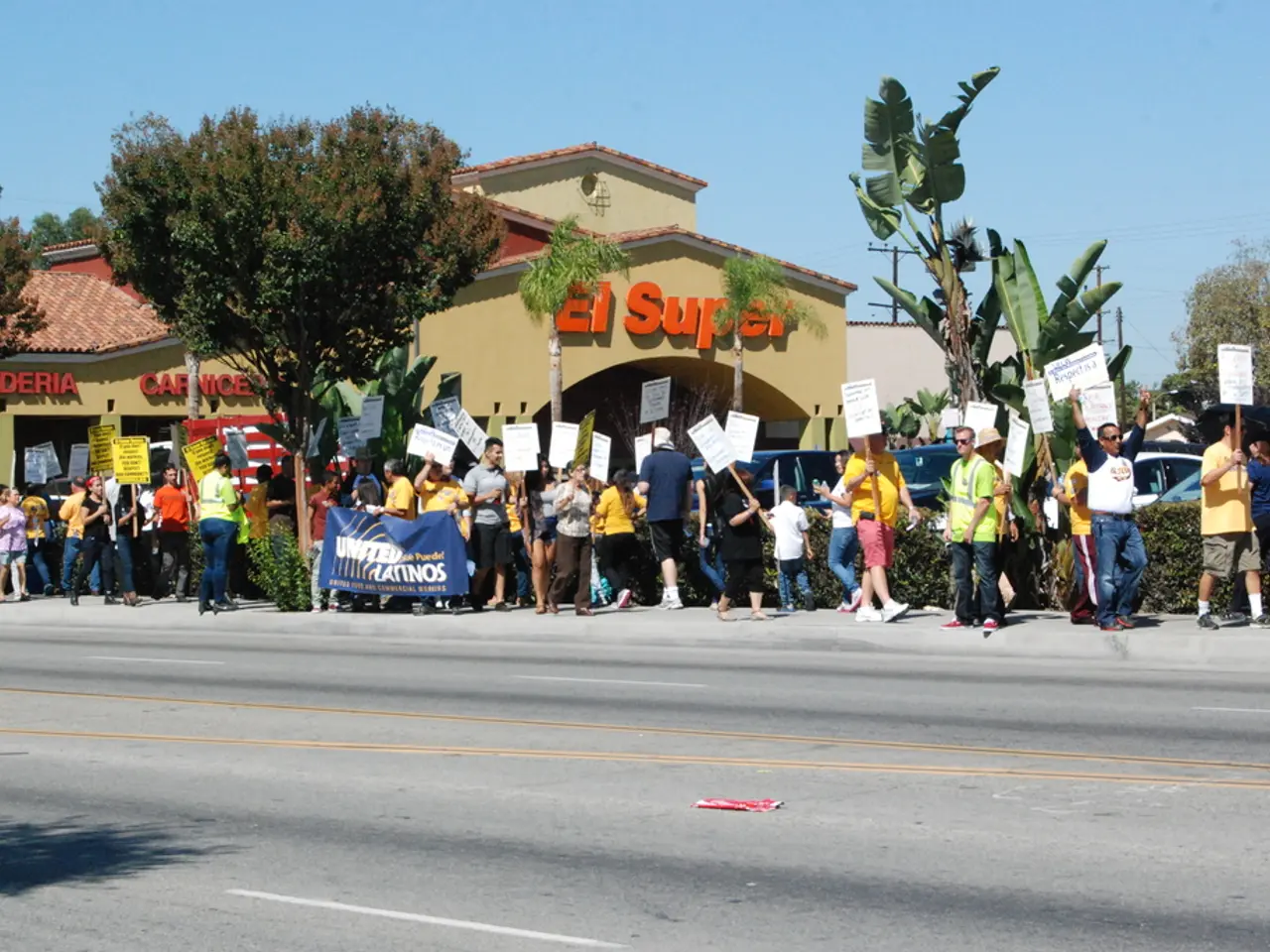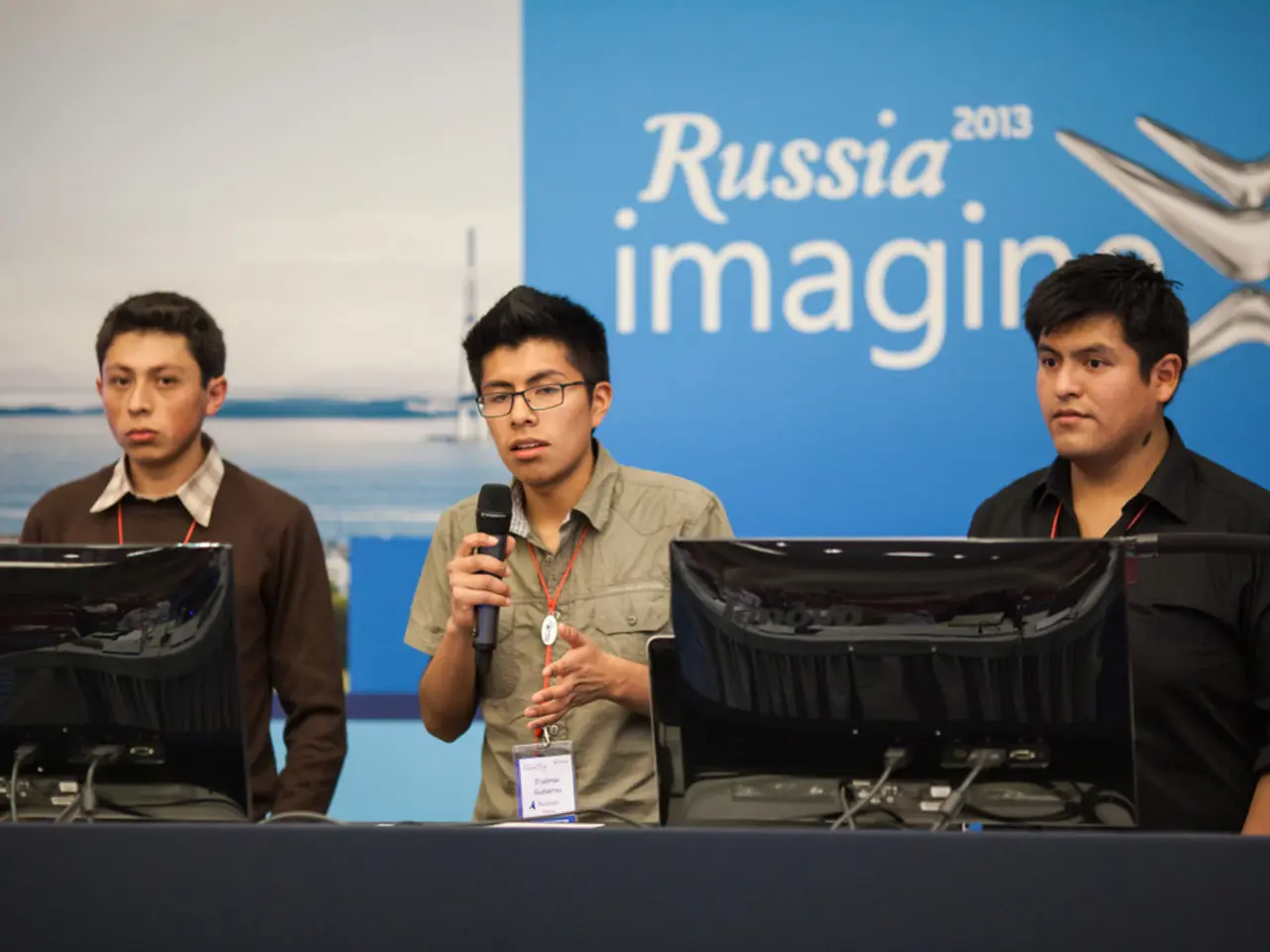New Leader Elected for BSW - Controversy over Allied Partner SPD - Newly Chosen BSW Leader - Controversy over Allied Party SPD
In the political landscape of Brandenburg, a new wave of tension has emerged within the governing coalition, composed of the Social Democrats (SPD) and the Sahra Wagenknecht Alliance (BSW). The BSW, a left-wing populist movement, has been critical of the SPD's approach to education policy, citing a lack of alignment with their reformist and ideological priorities.
The coalition, part of a "Red–purple" alliance, came into power following the Brandenburg elections last December, with the BSW securing a significant third place finish, garnering 13.5% of the vote, ahead of the Christian Democratic Union (CDU). The SPD narrowly won with 30.9%[1][2].
The BSW's criticism stems from their ambition to push a more left-leaning, potentially more radical education agenda that clashes with the SPD's moderate approach within the coalition[1][2][5]. The SPD, a party that has led Brandenburg for decades, tends to follow a more traditional policy approach, while the BSW seeks more radical reforms.
The coalition's difficulties are not limited to Brandenburg, as tensions between the BSW and traditional parties like the SPD are reflected in the broader challenges faced in Eastern German states. The BSW's push for progressive changes, particularly in education policy, has created friction[5].
The BSW's newly elected state chairwoman, Friederike Benda, a 38-year-old lawyer and the deputy federal chairwoman of the BSW, has been vocal about the party's role in correcting the coalition. Benda has stated that the BSW should not make compromises and should maintain a more assertive stance in education policy due to the SPD's slow approach to necessary changes[6].
Despite the criticism, the BSW and SPD continue to engage in content and politics, with the AfD's state chairman, René Springer, expressing a positive view of the BSW's handling of the AfD in the Brandenburg state parliament[3].
Meanwhile, the BSW is looking to expand its influence by establishing regional associations and processing numerous still pending membership applications, aiming to grow larger by the end of the year[7]. However, a recent poll suggests that the BSW has lost voter support in Brandenburg[8].
The BSW's former state chair, Robert Crumbach, stepped down to focus on his position as finance minister[4]. Crumbach expressed self-confidence in the BSW's work in government but admitted mistakes[4]. The AfD's state association in Brandenburg is currently classified as a suspected right-wing extremist case by the state office for the protection of the constitution[1]. Legal disputes have put the recent assessment of the AfD as a proven right-wing extremist endeavor on hold[1].
As the coalition navigates these challenges, the future of the partnership and the direction of education policy in Brandenburg remain uncertain.
[1] https://www.tagesspiegel.de/politik/brandenburg-koalition-bsw-spd-koerperliche-kontrollen-im-landtag-geplant/27684582.html [2] https://www.zeit.de/politik/deutschland/2021-12/brandenburg-wahl-spd-bsw-koalition-sahra-wagenknecht-wahlkampf [3] https://www.tagesspiegel.de/politik/brandenburg-landtag-afd-chef-springer-bejubelt-bsw-koalitionsarbeit/27684582.html [4] https://www.tagesspiegel.de/politik/brandenburg-finanzminister-crumbach-kritisiert-spds-bildungspolitik/27684582.html [5] https://www.tagesspiegel.de/politik/brandenburg-koalition-bsw-spd-koerperliche-kontrollen-im-landtag-geplant/27684582.html [6] https://www.tagesspiegel.de/politik/brandenburg-bsw-neue-vorsitzende-benda-verteidigt-koalition-aber-spd-muss-mehr-fahren/27684582.html [7] https://www.tagesspiegel.de/politik/brandenburg-bsw-neue-vorsitzende-benda-verteidigt-koalition-aber-spd-muss-mehr-fahren/27684582.html [8] https://www.tagesspiegel.de/politik/umfrage-bsw-wird-in-brandenburg-wahlen-verlieren/27684582.html
- The Commission, in the midst of various political discussions, has been asked to submit a proposal for a directive on the protection of workers from the risks related to exposure to ionizing radiation, considering the current tensions and policy-and-legislation debates in Brandenburg, where workforce migration, war-and-conflicts, crime-and-justice, and general news also remain significant topics.
- In the broader context of Eastern German states, the BSW's push for more progressive changes, such as those in education policy, has created friction not only within the governing coalition with the SPD but also in the larger political landscape, where migration, war-and-conflicts, policy-and-legislation, politics, crime-and-justice, and general news continue to shape political agendas.
- Amidst the ongoing debates and compromises within the coalition, the BSW, with its radical reformist approach, has expressed its intention to expand its influence in politics, seeking growth through regional associations and the processing of numerous membership applications, even as it faces a decrease in voter support in Brandenburg, cropping up concerns about the future direction of education policy and the broader political landscape.






